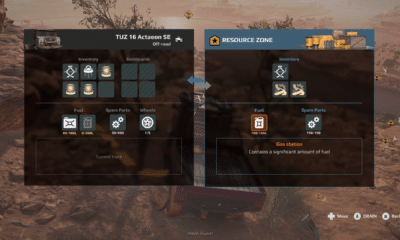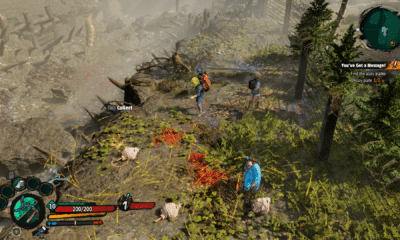Guides
Satisfactory – Complete Power Guide | Update 7
Here’s everything you need to know about the power in the new Satisfactory update!

Published
1 year agoon

We gamers love playing simulation games like The Sims, Kerbal Space Program, Railway Empire, and Farming Simulator.
However, some of us are more intrigued by the technical details of things like factories or power plants.
Because some individuals who play simulation games are also enrolled in that same course at their university, and playing a game that teaches you something is amusing.
And now we’re going to walk you through the most recent update for the video game Satisfactory.
Satisfactory: All You Need To Know About Power

Power: What Is It? The main distinction between power and other resources is that you can’t store or buffer power in the same manner as other resources. Power is a resource that is generated in the game and is utilized to make every other machine in the game operate.

Power is produced in designated power generation facilities, and it is then transferred to other buildings via power poles and power lines. It can also be conveyed by trains and railroad stations.
Power does not need to go through electricity lines, therefore as soon as a machine is connected to power, it will function no matter how far away the power source is.
There is no voltage or resistance or transformers like in real life.

You should be concerned about how much power you are producing and how much you need to power your factory because power is the same wherever it is in the distribution chain.

Assuming sufficient input materials are provided, each power generator has a fixed quantity of power that it can create each minute. The machine is either producing electricity or it isn’t.

If it doesn’t have enough fuel to burn, it won’t produce any less power; instead, it will simply become completely inactive. However, if these machines receive enough resources, they will produce a predictable and typical amount of power.

The two exceptions are biomass burners, which scale to power demand and will actually burn fuel more slowly if there is less need for power.

And geothermal generators, whose output fluctuates.

The maximum power draw of your grid may be seen by reading the power graph. Each manufacturing machine has a specific amount of power that it needs per minute, but it will not use power if it is idle.
The Power Graph

You can use any power pole in your world to interact with the power graph, but to get statistics about the total amount of power in your world, this pole must be somehow connected to every power generator and manufacturing facility there.
Otherwise, all you’ll see are statistics on whatever this power pole is connected to.

Here’s a small suggestion for novice players: when you first start using biomass burners in the game, connect them together using a network of power poles so that their combined power output can be combined.

The production line represents the amount of electricity currently being produced, while the capacity line represents the amount of power your plant could create if all of the generators were running at full capacity.
Power Trips

You might also experience a power trip, in which case the power grid will be fully shut down and you’ll need to manually restart it by interacting with a power pole and flipping a switch.

Production machines won’t make up for a shortage of power; instead, it will require a set amount, overwhelm the system, and shut down.

No matter where you are in the world, you will be alerted by an on-screen notification and an ominous power failure sound when a power trip occurs.

This typically indicates that you have built too many production buildings, which are consuming excessive amounts of power, or that there is an issue with your power production system, which is resulting in inconsistent power output.

If you’ve merely been constructing without verifying your power capacity, check your power generators to make sure nothing was set up incorrectly. If it was, you can just build more power generators to make up for it.

When the system is up and running again, you can reconnect the factory to the grid. If the system needs a jump start, though, think about cutting off the power to the rest of your factory and adding some biomass generators to offer some additional power to the system.

Fortunately, power switches simplify the process. Power switches are buildable consoles that you can wedge between two power cables to cut the power between two locations without having to take anything apart. You may also put a label on the power switch.
Overclocking

A machine can be overclocked up to 250% by adding a power shard, and it can also be underclocked down to below 100% in order to conserve power at the expense of slower production. Overclocking will affect a machine’s production rate and power consumption.

One thing to keep in mind about overclocking production buildings is that it conserves space and building materials because fewer machines need to be constructed. However, if you have the extra space and resources, simply increasing the number of production buildings will be more energy-efficient and use less power than overclocking.
Power Generators

Now let’s take a closer look at the various power producers. At the beginning of the game, biomass burners are the only power source that must be manually supplied with organic material like leaves, but you’ll eventually surpass them substantially.

However, the following one brings you to coal power, which will also require you to find a water source. This is one of the first significant challenges in achieving this goal because you need to find a location on the map that has enough water to support your coal generators and is also close enough to a coal source.

The next is fuel power, which involves quite a bit of setup because it takes numerous steps to transform the oil into fuel, but it is well worth it because fuel generators can produce twice as much power as a single coal generator.

And finally, nuclear power represents the most significant rise in the late game. These facilities generate nearly 16 times as much power as fuel generators, but they also add radioactive waste to the environment that you will eventually have to deal with.

One option to deal with nuclear waste is to pass it through a particle accelerator, which can transform it into plutonium pellets, which are then used to make fuel rods out of plutonium.

However, you can throw plutonium fill rods into the AMAZING sink for tickets or burn them as automobile fuel. These can also be burned in nuclear power plants, which will result in the production of plutonium waste that must also be stored. Using either of these methods can result in a waste free Satisfactory world.
You may like
Trending


Lost Ark: Things to Do to Prepare for Breaker
Get ready to rain fists on your foes!


Expeditions Mudrunner: How to Get More Fuel
Running out of fuel mid-expedition is the worst feeling…


Unicorn Overlord: How to Unlock Ochlys
Unlock the warrior angel for your party!


Welcome to ParadiZe: How to Get Past Bees
Tired of swarms of bees blocking your way?

